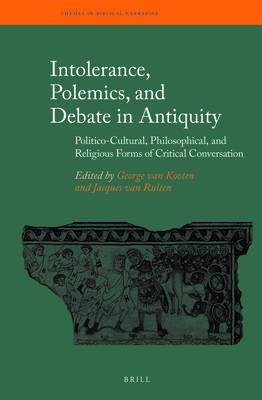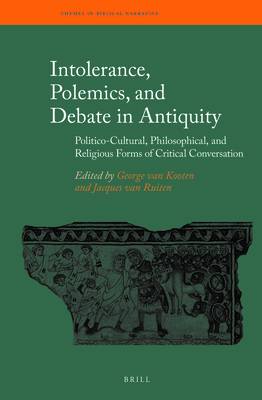
- Afhalen na 1 uur in een winkel met voorraad
- Gratis thuislevering in België vanaf € 30
- Ruim aanbod met 7 miljoen producten
- Afhalen na 1 uur in een winkel met voorraad
- Gratis thuislevering in België vanaf € 30
- Ruim aanbod met 7 miljoen producten
Zoeken
Intolerance, Polemics, and Debate in Antiquity
Politico-Cultural, Philosophical, and Religious Forms of Critical Conversation
€ 503,95
+ 1007 punten
Omschrijving
In Intolerance, Polemics, and Debate in Antiquity scholars reflect on politico-cultural, philosophical, and religious forms of critical conversation in the ancient Near Eastern, Biblical, Graeco-Roman, and early-Islamic world. They enquire into the boundaries between debate, polemics, and intolerance, and address their manifestations in both philosophy and religion. This cross-cultural and inclusive approach shows that debate and polemics are not so different as often assumed, since polemics may also indicate that ultimate values are at stake. Polemics can also have a positive effect, stimulating further cultural development. Intolerance is more straightforwardly negative. Religious intolerance is often a justification for politics, but also elite rationalism can become totalitarian. The volume also highlights the importance of the fluency of minorities in the dominant discourses and of their ability to develop contrapuntal lines of thought within a common cultural discourse.
Specificaties
Betrokkenen
- Uitgeverij:
Inhoud
- Aantal bladzijden:
- 616
- Taal:
- Engels
- Reeks:
- Reeksnummer:
- nr. 25
Eigenschappen
- Productcode (EAN):
- 9789004410671
- Verschijningsdatum:
- 17/10/2019
- Uitvoering:
- Hardcover
- Formaat:
- Genaaid
- Afmetingen:
- 160 mm x 236 mm
- Gewicht:
- 1111 g

Alleen bij Standaard Boekhandel
+ 1007 punten op je klantenkaart van Standaard Boekhandel
Beoordelingen
We publiceren alleen reviews die voldoen aan de voorwaarden voor reviews. Bekijk onze voorwaarden voor reviews.







